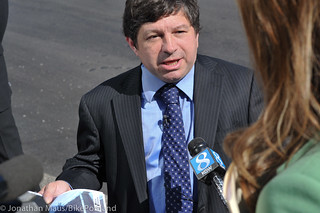
a street fee press conference in April.
(Photo J. Maus/BikePortland)
The City of Portland’s effort to raise new revenue for transportation via a “Transportation Users Fee” (a.k.a. street fee) will likely face its toughest crowd ever at a town hall tomorrow morning.
The event, one of two town halls set for this week, will focus only on the business/non-residential side of the fee, which has emerged over the past month as the most controversial aspect of Transportation Commissioner Steve Novick’s proposal. Skepticism and concern from business groups (like Venture Portland) about how the fee will be calculated was raised at the City Council hearing late last month and it has gained steam since.
Novick and Mayor Charlie Hales had initially planned to have the fee passed by City Council and on its way to implementation by July 15th, but as critics of the business fee have gotten louder and more active in recent weeks (there’s now a Stop the Street Fee Facebook page with 1,792 likes) they’ve delayed that vote in favor of allowing more public dialogue. When they first announced this new round of town halls, the non-residential event was planned to be at the headquarters of Venture Portland, but citing “higher than expected interest,” PBOT changed the venue to the much larger Oregon Convention Center.
Advertisement
PBOT’s current plan for the household fee is to phase it in over three years, with single-family households paying $6, $9, and then $12 per month. But on the business side, it’s more complicated. Each business and organization will be charged based on how many trips they generate. As The Oregonian reported today, a Brugerville drive-through would pay about $1,200 per month.
Much of the push-back about the business fee revolves the fairness — or lack thereof — of that calculation.
The City of Portland is using the national standard used for trip generation, the “ITE Manual” (Institute of Transportation Engineers’ Trip Generation Manual). However some say that not only is that manual flawed to begin with, but PBOT is tweaking the formula to reflect their own expertise and our local context. While admirable, that’s making some people lose confidence in the entire process.
Local transportation engineer Brian Davis wrote a useful primer on the ITE Manual on PortlandTransport.com.
For their part, Novick and Hales have remained resolute about their goal of passing something that will raise around $50 million per year (which is what their current plan would generate). They’ve said they’re open to new ideas about alternative proposals, but giving up on this effort isn’t an option.
“There’s no question we need to invest in basic transportation maintenance and safety,” said Hales in a statement last week.
And both Hales and Novick stumped for the fee last week when city council unanimously passed the Foster Streetscape Plan. That plan (funded by a combination of federal and urban renewal funds) was widely celebrated by neighborhood activists and council members.
“If we were able to have approximately $20 million a year for safety-related projects, then we could guarantee a celebration like this four times a year. Or, something half this big eight times a year. This is the kind of project we can do with appropriate resources,” Novick said.
And Hales also didn’t pass up the opportunity to plug the need for the street fee. “It’s money that matters,” he said, referencing Randy Newman lyrics prior to his “yes” vote on the Foster plan, “We need to make sure this doesn’t become a shelf project. We need to get serious about funding so we don’t do shelf-studies.”
Here are the details on the two town halls (for more, visit OurStreetsPDX.com.
- Town Hall on Business and Non-Residential Fee
8 to 9:30 a.m., Tuesday, June 24
Oregon Convention Center (Portland Ballroom 255, 777 NE Martin Luther King Jr. Blvd.)
Town Hall on Residential Fee
6:30 to 8:30 p.m., Wednesday, June 25
Kaiser Permanente Town Hall (3704 N Interstate Ave.)



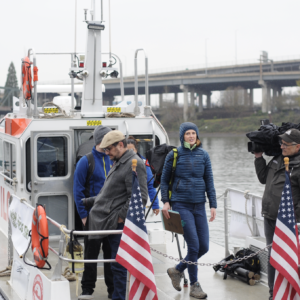
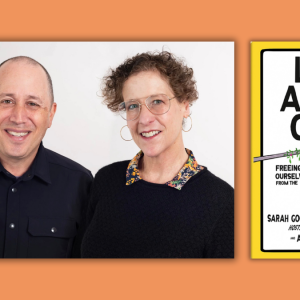
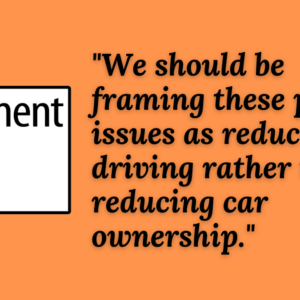
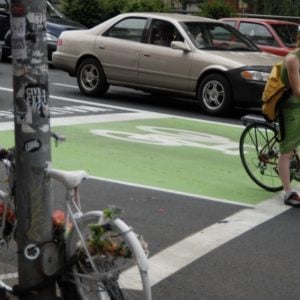
Thanks for reading.
BikePortland has served this community with independent community journalism since 2005. We rely on subscriptions from readers like you to survive. Your financial support is vital in keeping this valuable resource alive and well.
Please subscribe today to strengthen and expand our work.
“PBOT’s current plan for the household fee is to phase it in over three years, with single-family households paying $6, $9, and then $12 per year. ”
I thought the fee was per month. Has this changed, or did I misunderstand the original news about it?
You’re right A.K. It’s per month. My mistake. I fixed the story. Sorry for any confusion.
My current plan is to phase out Hales and Novick in the next election.
What’s your plan to fund street maintenance and safety upgrades?
reduce speed limits, increase enforcement, raise gas taxes, parking fees (increased and expanded) and registration fees increased and pro-rated by weight)
I’m getting really tired of those 2 very quickly.
It’s easy, stop spending money on un-needed pet projects. Budget the money better, clear out the deadwood/outside consultants. Knock off that stupid 2% that goes to public art …etc.
then you won’t have to keep harassing the population.
>>PBOT’s current plan for the household fee is to phase it in over three years, with single-family households paying $6, $9, and then $12 per year. ”
>>I thought the fee was per month. Has this changed, or did I misunderstand the original news about it?
that was my understanding also.
The cost of asphalt and wages are going up every year, and the amount of gas tax collected goes down every year. We can’t keep the roads paved with just the current gas tax. Options:
1) Raise the gas tax (this should be done at the state and federal levels)
2) Street fee
3) Take money from the general fund, i.e. Police, Fire and Parks.
They tried 4) Use money from Water / Sewer for transportation improvements, but that didn’t go over well.
1) and 3) are politically difficult, the Street Fee was supposed to be the easy way.
There is no rational reason that PBOT should get a lower percentage of the general fund than Parks and Rec. Choo-Choo and company simply don’t know how to prioritize a budget. The city auditor (a champion in my book) specifically called PBOT out for a failure to prioritize spending yet here we are, being treated like the council’s ATM again. Candidate Hales promised to reduce city overhead and it hasn’t happened. Has he forgotten or was he just saying whatever he needed to to get elected? Personally I think we should send him back to HDR to keep slangin’ street cars to other cities, we have enough here.
Here’s the thing, we are already pay for street maintenance through the general fund but our “leaders” have consistently blown the money on other things.If they can’t get the basics right, what makes anybody think it’s a good idea to get them more money? If you do, please remove your head from your 4th point of contact before you suffocate. If Mr. Hales blames the federal gas taxes for this debacle one more time I’ll pull my hair out. If it hasn’t been raised since the 90’s and local governments have had way more time to adjust than needed.
I’ll be at the meetings listening to those ly1ng l1ars again for all the good it will do. This stinker will blow up in their faces at the polls.
Not that I have an opinion or anything.
Yes, I don’t really see the point now in attending more town halls. Hales and Novick have made it very obvious that they don’t care about the public input on this issue. Honestly I think our time would be better spend to start planning to recall them.
I’ll help davemess.
Rob: You should be aware that federal highway funds can only be used for capital projects, not for maintenance. There is, however, a connection.
Back in the old days (pre-90s) the requirement was only about 10 to 15 percent local match for federal construction funds. As competition among states heats up and as the amount of federal funds dwindles, the local match requirement has gone up. So, states and local agencies seeking federal grants for projects have had to put up additional local dollars. Often they have come out of the funds previously set aside for maintenance. And it’s not just evil highway projects, it’s discretionary funds used for things such as multi-use paths, and TriMet’s Tillikum Crossing.
Thanks for the clarification. Talking to my egghead economist friend apparently there are also complications in charging freight due to federal regulations as well, bummer.
FHWA also distributes preventive maintenance funding – how much of that does PBOT use and where?
Please identify the funds you are talking about.
“Each business and organization will be charged based on how many trips they generate.”
This is completely nuts. How much will it cost to calculate, administer, update & collect the money in this fashion every year? It has to be substantial.
“They’ve said they’re open to new ideas about alternative proposals”
I have one. And I’ve mentioned it dozens of times before, so I won’t again.
Joseph E: “1) and 3) are politically difficult, the Street Fee was supposed to be the easy way.”
This is as good an illustration as any of how bunk the preconceptions about how unpalatable hiking the gas tax is supposed to be.
The gas tax is a proven, highly efficient method of collecting funds to maintain our infrastructure while simultaneously discouraging/penalizing the actions responsible for the majority of the deterioration. Why screw around with Soviet style calculations that in the end achieve something not so different from what a gas tax would have, but with a costly bureaucracy and lots of mad constituents?
What about raising a local gas tax. Sure mileage driven is gradually being reduced, but driving gas cars is not going away anytime soon. Surely even a minute increase (or addition) of a local gas tax would still produce decent funds.
Rob,
Council tried that already and it was fought by gas retailers.
This is going to be a fight regardless. The business/non-res meeting this morning got a little wild. I was actually a little surprised.
They’re fighting with the general public on this already.
I agree with the general outlines of what you say. On expensive consultants: it’s a fact of life that running a city requires many professional, technical and expert services. Hiring consultants – a practice which I’ll be the first to admit probably leaks a certain amount of money from the budget unnecessarily – is still much cheaper, more flexible, and short-term than adding such professionals to the staff, where they collect salary and benefits more or less in perpetuity.
I don’t want to live in a city that actually doesn’t consult outside experts. That said, yes, Portland can and should reform its technical and professional contracting practices.
outside professionals are basically short-term temp help. The cost of a new hire includes salary, benefits and time to train, and could last for many years. So if you only need someone for a 1-year project, and you don’t know how things will look a year out from now, temp help is a low-tax way to go for a city.
I a solution worth exploring would be as follows:: repeal the gas tax completely, and levy a fee based on the weight of an owned vehicle. If you only use public transportation and don’t own a vehicle, you pay nothing. If you have a bicycle, you pay a few dollars a year. If your household owns 2 SUVs, you pay a lot more. That would be a “fair” way to tax road usage.
Yes, some costs will be handed down to consumers. But that would only incentivize businesses to find better/lighter/cheaper/more environmentally-friendly ways to conduct business.
Where do we weigh those vehicles? Sounds good, but the start up cost would be high. How do we collect the fee? Ever been in a line at the DMV?
You have those same issues with this proposed fee (remember that councilors have already said that it can’t won’t be tacked on to the water bill). Collection of the Arts Tax has been spotty, difficult and expensive. At least the gas tax already has built in infrastructure for collection (and not need for enforcement).
Well, we could start by taxing every piece of heavy equipment trucked from other towns to rip up my neighborhoods. How much does a trailer with a bulldozer weigh? Tax ’em.
Secondly, Novick is carefully protecting the partnerships and LLCs that own multi-family buildings. We need to call him on this- Pearl District condo towers can afford 12 dollars a month (low-income apartments should get a break).
Furthermore, we can take the 7 million proposed for Chinatown apartments
and the 20 million for new light rail and put that towards the streets.
Hey- I am halfway there! We just need 50 million.
Finally, new infrastructure- bridges, bike share etc- they should be funded with a fee. Want bike share? Tax downtown business owners. Roads shouldn’t be held hostage to this process- we should be fixing the roads and then debating a funding source for new light rail. We should have had a discussion on a fee to pay for the extension of light rail.
But- what do we expect from Novick? He got a “free pass” from most on this blog when he/Treat/Rivera lied repeated about the Connect Oregon grant application.
Lies are like cock roaches- there’s always more than one.
Your second point has not been brought up enough! That is a big deal.
You raise a great point here Hart. From Mr. Novick’s own mouth at the Interstate town hall if I recall correctly that big trucks and weather cause the most road damage. You can’t charge the weather but I haven’t heard a word out of his big mouth about levying a tax on trucks, you know the things that ruin the roads.
Is this due to a) a lack of backbone b) a lack of political capital or c) a combination of both?
Or studded tires?
The city does not have the power to tax/ban studded tires – that can only be done at the state level.
If only the city had some kind of pull with the state…….
But THE REAL SOLUTION IS A REGRESSIVE TAX. Duh.
Are you saying we can’t come up with anything better than that?
Even I can think of a better solution.
Forgive my grammatical errors, it’s a PITA to edit on mobile!
Raise the gas tax already!
Adjusted for inflation with 1993 as the base (last time the federal gas tax was increased) and the federal gas tax would be 31.3 cents per gallon and the Oregon gas tax would be 40.8 cents per gallon. Note that the Hales/Novick street fee proposal has an indexing component; they already know that the revenue stream needs to increase to account for inflation.
Those actions would require congressional and state legislative approval. So, do what a dozen Oregon cities and two counties do: have a local option gas tax. Multnomah County’s gas tax is 3 cents per gallon and is shared with cities, including Portland.
Advantages of a gas tax: 1) It’s proportional to use; the more you drive, the more you pay. 2) Everyone who buys gas in the city pays some portion, even if they are from the suburbs or from out-of-town. 3) It’s really easy to administer because the system is already in place. 4) There’s no need for a complicated bureaucracy for collection of fees or to handle appeals of trip generation rates.
5) The heavier the vehicle the lower the fuel economy, so the more they pay.
Since I’m in rant mode….
Does a city who’s roads are in imminent danger of collapse into third world conditions need a mansion (which it appears just had close to $1m in terrace repairs), a waterfront stable, indoor tennis courts, 5 (?!) golf courses, a racetrack, and an eastside streetcar with 3 people on it? It sounds like the freaking Koch brothers compound around here.
This is why we can’t have nice (basic) things.
“and an eastside streetcar with 3 people on it”
Categorically false, but thanks for doing your best OLive commenter impression. You’re a natural!
I’ve never seen more than three people on it in the Central Eastside side have you. Thanks for the insult though!
http://www.portlandonline.com/auditor/index.cfm?c=64479&a=487580
Looks like Portland Streetcar is a hot mess.
In every political fight, someone gets tarred as a “tax & spend” politician. These 2 actually are.
>>The City of Portland and Multnomah County both have Percent-for-Art ordinances that require 2% of most publicly-funded capital construction projects to be set aside for the creation and maintenance of public art.
http://www.racc.org/public-art/overview-opportunities
Have you seen this “art” ? The Money Tree at 205 MUP at Powell ? The Flappy Wings at 205 MUP (behind Home Depot ) ? The Sunburst at MAX Burnside station ? And who knows what else ?
Use THAT 2 percent for roads.
It’s all hideous junk. And it’s ridiculous that we are paying for it when we clearly have higher priorities.
Your perception that 2% of any project would pay for much of anything is, literally, ridiculous.
And statements like that are exactly why the general public doesn’t trust PBOT’s finances.
2% of a $1 million dollar project is $20,000. two regular curb extensions, or one green one, or maybe a couple refuge islands.
But 2% of $46M is almost $1M, which would fund an entire other project.
Fine-tune some calculations on this: Assume whatever the average estimated miles traveled per year times average vehicle weight and issue a preliminary bill with registration renewal notices.
At registration, the DEQ testing station calculates the miles traveled since the previous registration (if any registration and if any miles), reconciles the difference between estimate and reality, and charges based on actual numbers.
I don’t know how many surviving vehicles are too old to have to go through DEQ (I know of one), but those would be billed on the average. If that seemed unfair to the owners, they could go through DEQ like the rest of us and pay on the actual.
And charge a 50% penalty for studded tire use. The damage they do has got to be proportionate to weight and miles driven.
The DMV already charges a weight-mile tax on long-haul trucks, so it might be feasible to incorporate autos into that system, but you still have the admin fees from DMV to process the new vehicles. It’s not something the City could inexpensively initiate.
As for studded tires, the legislature can ban them, or further restrict the time frame of use, or increase the surcharge already charged for them. Contact your electeds and see what they say.
As a non-car owner, I’d prefer to pay my share via price increases that reflect the tax, on delivery services that bring me stuff. I don’t have enough knowledge to say whether that approach is progressive, regressive, or MORE regressive than the street fee, since it means raising prices on all truck-delivered goods in the city–which is, effectively, all the goods in the city.
I am voting these two *****s out come November. I am sick and tired of being treated like an ATM. This kind of BS is exactly why the middle class is getting squeezed out of their homes in Portland. It is coming to the point where I may need to sell my house because I’m already paying $6,500 / year in property taxes. VOTE THESE *****s OUT COME NOVEMBER!
Wait are we classifying someone in a $500-600k home as middle class?
Run on that platform and let me know how it works out. talk is cheap.
I don’t want to subsidize driving like my mayor wants me to. It’s already heavily subsidized. Good grief; they need to wake up and raise the gas tax.
And since the gas tax is intrinsically weight based, it would tax heavier vehicles more. It would also encourage hybrid and electric vehicles, in line with clean air policy, but we will need to figure out how to tax such users when they become the dominant motor vehicle.
Maybe a referendum to the voters about which they would prefer, flat tax per household/business or local gas tax would be a good interim step.
Honestly when do you think electric vehicles (remember hybrids still use gas) will become the dominant vehicles, 20 years, 30 years? I get that eventually this might become a reality and the gas tax will be obsolete, but that day is a really long time away.
dominant might be 20 years. But a doubling of average fuel economy will halve gas tax revenues, and the average fuel economy will go to 30 or 40 mpg faster than 20 years. Isn’t kicking the can down the road for our children to deal with part of why we are in the current mess? We need to think long term. Short-term thinking is and American cultural phenomenon.
“But a doubling of average fuel economy will halve gas tax revenues, and the average fuel economy will go to 30 or 40 mpg faster than 20 years.”
I think you’re confusing *new* mpg with fleet mpg. We’ve had CAFE for, what, almost forty years, and fleet mpg hasn’t budged much at all in the past 25 years.
Also doubling fleet mpg will only halve gas tax revenues if VMT remain constant and the gas tax isn’t increased.
Are we supposed to think that $1,200/mo for a 4,400 sq ft Burgerville is too high? A busy, successful fast food chain restaurant like BV probably does $3-4 million/yr in sales per store.
(I don’t have inside knowledge on BV’s financials. This is based on typical sales/sqft and sales/store productivity in the fast food industry.)
I am not feeling the street fee. Creating an entirely new collection resource is not an efficient means of funding for streets.
We already have auto registration. It is amongst the lowest in the West Coast. It is also collected every 3 years. Why not just make it yearly at the same cost people currently pay, and use all the additional funding those extra 2 years for Safety and Maintenance?
This will be collected from businesses with vehicles, residents, etc. All the key players. This just makes sense. No concern with diminishing gas tax returns. No extra envelopes costing $ being sent out, less need for other program management, etc.
Also, the gas tax has not kept up with inflation. It has not increased since 1993! Time to bump that up.
Our business districts could also require paid parking. Why are we allowing free parking? Add parking meters on Hawthorne, Belmont, NW 23rd, Etc….
Ideally, I would like to see something done about tax payers subsidizing big oil. Instead of subsidizing, why not tax more at the pump and have that money directly impact the people with enhanced infrastructure? Some countries tax more at the pump than the actual gas. We could start creating the best alternatives to auto use by making these changes.
Does anybody know what the status of the VMT here in Oregon is? I’ve rented a diesel car in New Zealand before and they had a system that was novel enough that I saved a receipt.
Basically you walk into the post office (?!), report your odometer reading and pay for x amount of kilometers. You receive a tag that you have to display in the corner of your windshield. If you are checked and your mileage is over your paid mileage then you get fined. I believe it was only for commercial vehicles and diesels but I don’t see why a VMT couldn’t capture all vehicles, including electrics.
I’m not sure how effective enforcement is but it may be more palatable than GPS tracking for people with privacy concerns.
Noting your attitude/accuracy & comprehension , IF it is typical of PBOT , THEN I know where part of the problem is.
Insults aside, have you bothered to calculate what 2% of a $1 million dollar project is?
>>Twenty-eight Oregon cities are among just 32 in the United States that charge residents utility fees to pay for roads, and the only one that comes close to Portland in size or regional importance is Austin, Texas.
http://www.oregonlive.com/portland/index.ssf/2014/06/portland_street_fee_austin_whe.html
Wasn’t Oregon one of the first states to enact a gas tax?
where do you keep getting this $1 million dollar figure ? please cite.
And IF you are correct and it’s ONLY A MEASLY $20,000 , well..we are in “scrounge mode” and every bit counts.
insult ? naw, just calling it as it is.
>>Mayor Charlie Hales and Steve Novick have done a lot of work on their proposed street fee since it was first introduced on May 22.
>>Among other things, they have come up with discounts for low-income households, finalized a $53 million a year fundraising goal, agreed to spend 97 percent of the money on maintenance and safety projects, developed detailed maps about where the work would be done, and said they are open to ideas for collecting the funds from non-residential properties
http://portlandtribune.com/pt/9-news/225402-87424-street-fee-prompts-howls-of-protest
So 3% to overhead ? $1,600,000 ?
Better , but no cigar.
In Massachusetts, we have a vehicle excise tax that is paid to the local jurisdiction each year. It is based on a percentage of the value of the vehicle. The proceeds are used for local roads.
The advantage of this method is that is is a progressive tax and is deductible on your federal return. A fixed fee per household is regressive and isn’t deductible.